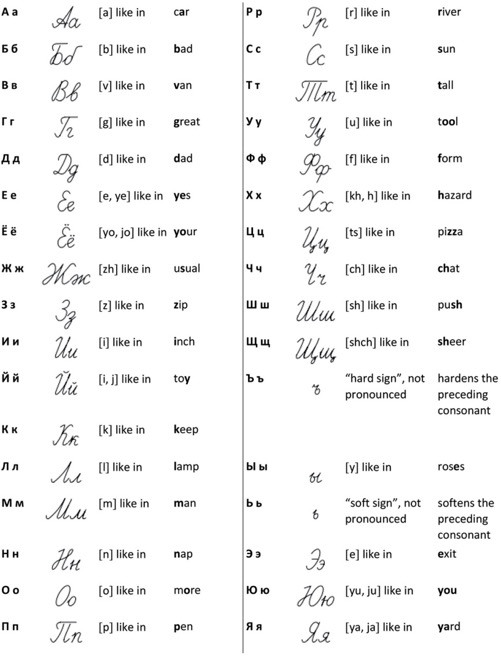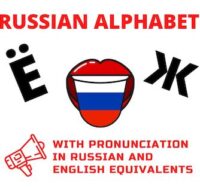In this article:
Russian Alphabet
To read and speak Russian, you will first need to understand Russian alphabet.
Russian writing and Russian script are usually the first topics to study for beginners in Russian.
Russian alphabet may seem way too different from English, but don’t feel overwhelmed. You will soon notice that many Russian letters resemble Latin script.
Comprehensive table: Russian letters (incl. cursive) with English equivalents
Impatient to read signs, menus, maps and place names in Russian? This table on Russian alphabet will guide you!
You will find printed letters alongside with handwritten cursive letters.

Russian cursive – handwritten letters
Russian “Cursive” (handwritten Russian letters) is slightly more difficult for learning because they look different from typed ones. However, the good news is that you’ll mainly come across computer-typed Russian words, just as they appear in dictionaries.
Russian alphabet contains 33 letters
- 21 consonants: б, в, г, д, ж, з, к, л, м, н, п, р, с, т, ф, х, ц, ч, ш, щ. We call the consonant letter й a semivowel, as its sound is close to [i]
- 10 vowels: а, э, ы, у, о, я, е, ё, ю, и
- 2 letters of the Russian alphabet do not designate any sound. They are the “soft sign” (ь), which softens the previous consonant, and the “hard sign” (ъ), which does the opposite
Russian Pronunciation
In Russian, the pronunciation is slightly different from the spelling. Two important things to keep in mind are:
- the stress (for vowels)
- the influence of surrounding letters (for consonants). In short, a soft neighbor letter makes the preceding letter softer, and a voiced letter makes the preceding letter sound stronger
Vowel pronunciation in Russian
- The stress of a word always falls on a vowel
- Stressed vowels get marked with the acute accent (´) in dictionaries
- Words have only 1 stress, except for compound words (two words joined by a hyphen), like Москва́-река́ (Moscow River), де́вушка-краса́вица (beautiful girl).
- Letter ё, if present in the word, is always stressed, but there is no accent (stress) mark over it
- When a word has only one syllable – for example, зуб (tooth) and хлеб (bread) – we also don’t put the accent mark, as the stress will always fall on this very syllable.
Note: the accent is only typed over vowels in textbooks and books for learning Russian. Normally, this small accent sign is not used, unlike diacritical signs in other languages (é, à, ö, etc). In Russian, the accent is not an integral part of the letter, it just shows where the stress falls for Russian learners.
Related: How to Type Accents Over Russian Letters
Why same vowels in Russian words sound different?
While stressed vowels have rather distinct pronunciation, unstressed vowels undergo pronunciation changes (so-called voice reduction). For example, all three vowels ‘O’ in the same word, молоко́, are pronounced differently [m-la-kо́]:
- the first ‘O’ is the farthest from the stressed syllable, so the sound is very subtle and indistinct;
- the second one reduces its sound to “u” as in “under”;
- and the third one is fully pronounced because it appears with the stressed syllable.
Similar voice reduction happens to vowel “e”: in unstressed position its sound is close to “и”, for example, ведро́ [vi-drо́] (bucket), темно́ [ti-mnо́] (it’s dark), интере́сный [in-ti-rés-nyy] (interesting) and vowel “я”: in unstressed position its sound is close to “и”, for example, янва́рь [yin-vár’] (January).
Other vowels undergo minor reductions, unnoticeable for foreigners and even for many natives.
Placing stress on the correct syllable is essential when speaking Russian. Mistaken word stress not only sounds weird; it can also change the meaning of a word – this is especially true for homonyms, words that sound similar but mean different things.
Consonant pronunciation in Russian
Russian consonants differ in terms of whether they are voiced or voiceless, their point of articulation, and their manner of articulation.
With few exceptions, Russian consonants either sound “soft” or “hard”, “voiced” or “voiceless”, depending on the type of letter that follows them.
Russian Voiced and Voiceless Consonants
Voiced and voiceless consonants form pairs, for example:
б – п, в – ф, г – к, д – т, ж – ш, з – с.
Voiced consonants devocalize (in other words, we pronounce their voiceless pair instead) when:
- they are the last letter in a word: зуб [zup] (tooth), хлеб [khlep] (bread), Ивано́в [ivanо́f] (Ivanov)
- another voiceless consonant appears after them: слáдкий [slatkii] (sweet), ло́жка [lо́shka] (spoon), под столо́м [pat stalо́m] (under the table).
How Russian letters sound in context (within words)
Listen to the pronunciation!
This is an extract of the self-paced video course “Russian Grammar Made Easy (For Beginners and Beyond)” created especially for those who need to start learning Russian grammar from zero.
Learn more about the self-paced video course on Russian grammar
Related articles:
How to Learn Russian Efficiently
Russian Essential Grammar and Phrasebook – ebook or paperback
Ebook “Top 100 Russian Proverbs with English Translation”


4 replies on “Russian Alphabet – Discover How to Read Russian Letters”
[…] have previously spoken on Russian alphabet and on how to type in […]
Amazing article. I will definitely recommend my students this site. Education is the key for success. Alline from SpanishToGo
Pretty great post. I just stumbled upon your weblog and wished to say that I’ve really enjoyed surfing around your blog posts. After all I’ll be subscribing for your rss feed and I’m hoping you write again soon!
Thanks for sharing your info. I truly appreciate your efforts and I will be waiting for your further post thank you once again.|